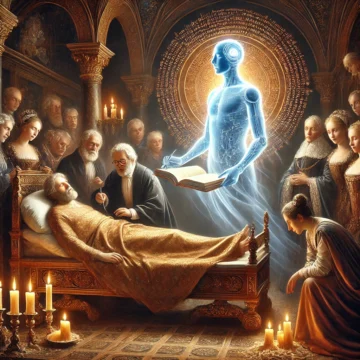by Gautam Pemmaraju
He felt closer to dust, he said, than to light, air or water. There was nothing he found so unbearable as a well-dusted house, and he never felt more at home than in places where things remained undisturbed, muted under the grey, velvety sinter left when matter dissolved, little by little, into nothingness.
 The narrator of WG Sebald’s The Emigrants informs us that the lonesome painter Max Ferber, worked in a studio in a block of ‘seemingly deserted buildings’ located near the docks of Manchester. His easel, placed in the centre of the room, was illuminated by “the grey light that entered through a high north-facing window layered with the dust of decades”. The floor, the narrator observes, was thickly encrusted by deposits of dried up paint that fell from his canvas as he worked, which in turn mixed up with coal dust, and came to resemble lava in some places. Thinking inwardly that “his prime concern was to increase the dust”, the narrator watches Ferber over the weeks working on a portrait, ‘excavating’ the features of the posing model. The melancholic painter’s tenebrous kinship with the accumulative debris of his days strikes him as profoundly central to the artist’s very existence, for as Ferber says to him, the dust itself “was the true product of his continuing endeavours and the most palpable proof of his failure”. Ferber had come to love the dust ‘more than anything else in the world’, and wished everything to remain unchanged, as it was. In the neon light of the transport café bearing the unlikely name of Wadi Halfa, Ferber’s haunt, and where the two often met after the day’s gloomy exertions in the ‘curious light’ of the studio that made everything seem ‘impenetrable to the gaze’, the narrator observes the dark metallic sheen of Ferber’s skin, particularly due to the fine powdery dust of charcoal. Commenting on his darkened skin, Ferber informs his companion that silver poisoning was not uncommon amongst professional photographers and that there was even an extreme case recorded in the British Medical Association’s archives:
The narrator of WG Sebald’s The Emigrants informs us that the lonesome painter Max Ferber, worked in a studio in a block of ‘seemingly deserted buildings’ located near the docks of Manchester. His easel, placed in the centre of the room, was illuminated by “the grey light that entered through a high north-facing window layered with the dust of decades”. The floor, the narrator observes, was thickly encrusted by deposits of dried up paint that fell from his canvas as he worked, which in turn mixed up with coal dust, and came to resemble lava in some places. Thinking inwardly that “his prime concern was to increase the dust”, the narrator watches Ferber over the weeks working on a portrait, ‘excavating’ the features of the posing model. The melancholic painter’s tenebrous kinship with the accumulative debris of his days strikes him as profoundly central to the artist’s very existence, for as Ferber says to him, the dust itself “was the true product of his continuing endeavours and the most palpable proof of his failure”. Ferber had come to love the dust ‘more than anything else in the world’, and wished everything to remain unchanged, as it was. In the neon light of the transport café bearing the unlikely name of Wadi Halfa, Ferber’s haunt, and where the two often met after the day’s gloomy exertions in the ‘curious light’ of the studio that made everything seem ‘impenetrable to the gaze’, the narrator observes the dark metallic sheen of Ferber’s skin, particularly due to the fine powdery dust of charcoal. Commenting on his darkened skin, Ferber informs his companion that silver poisoning was not uncommon amongst professional photographers and that there was even an extreme case recorded in the British Medical Association’s archives:
In the 1930s there was a photographic lab assistant in Manchester whose body had absorbed so much silver in the course of a lengthy professional life that he had become a kind of photographic plate, which was apparent in the fact (as Ferber solemnly informed me) that the man’s face and hands turned blue in strong light, or, as one might say, developed.
 In Carloyn Steedman’s Dust (2001), an intriguing collection of essays on a most curious set of concerns, she writes that in the early 19th century “a range of occupational hazards was understood to be attendant on the activity of scholarship”. She makes clear the distinctions between Derrida’s seminal meditations on Archive Fever (see some interesting entries here, here & here), the febrile “desire to recover moments of inception; to find and possess all sorts of beginnings”, from Archive Fever Proper. There was a specific attention to dust and the ill effects it had on artisans and factory workers, during the 19th century and the early 20th century. She points to Charles Thackrah’s investigations into the occupational diseases arising from various trades, particularly in the textile industry, wherein the employments produced ‘a dust or vapour decidedly injurious’. In John Forbes’ Cyclopeadia of Practical Medicine of 1833, Steedman writes, there was also an entry on ‘the diseases of literary men’, a subject of interest among investigators, albeit, for a short thirty year period between 1820 to 1850. In Forbes’ view, the ‘brain fever’, no mere figure of speech as Steedman points out, was a malaise of scholars caused predominantly “‘from want of exercise, very frequently from breathing the same atmosphere too long, from the curved position of the body, and from too ardent exercise of the brain.’”
In Carloyn Steedman’s Dust (2001), an intriguing collection of essays on a most curious set of concerns, she writes that in the early 19th century “a range of occupational hazards was understood to be attendant on the activity of scholarship”. She makes clear the distinctions between Derrida’s seminal meditations on Archive Fever (see some interesting entries here, here & here), the febrile “desire to recover moments of inception; to find and possess all sorts of beginnings”, from Archive Fever Proper. There was a specific attention to dust and the ill effects it had on artisans and factory workers, during the 19th century and the early 20th century. She points to Charles Thackrah’s investigations into the occupational diseases arising from various trades, particularly in the textile industry, wherein the employments produced ‘a dust or vapour decidedly injurious’. In John Forbes’ Cyclopeadia of Practical Medicine of 1833, Steedman writes, there was also an entry on ‘the diseases of literary men’, a subject of interest among investigators, albeit, for a short thirty year period between 1820 to 1850. In Forbes’ view, the ‘brain fever’, no mere figure of speech as Steedman points out, was a malaise of scholars caused predominantly “‘from want of exercise, very frequently from breathing the same atmosphere too long, from the curved position of the body, and from too ardent exercise of the brain.’”
Read more »


 Everyone grieves in their own way. For me, it meant sifting through the tangible remnants of my father’s life—everything he had written or signed. I endeavored to collect every fragment of his writing, no matter profound or mundane – be it verses from the Quran or a simple grocery list. I wanted each text to be a reminder that I could revisit in future. Among this cache was the last document he ever signed: a do-not-resuscitate directive. I have often wondered how his wishes might have evolved over the course of his life—especially when he had a heart attack when I was only six years old. Had the decision rested upon us, his children, what path would we have chosen? I do not have definitive answers, but pondering on this dilemma has given me questions that I now have to revisit years later in the form of improving ethical decision making at the end-of-life scenarios. To illustrate, consider Alice, a fifty-year-old woman who had an accident and is incapacitated. The physicians need to decide whether to resuscitate her or not. Ideally there is an
Everyone grieves in their own way. For me, it meant sifting through the tangible remnants of my father’s life—everything he had written or signed. I endeavored to collect every fragment of his writing, no matter profound or mundane – be it verses from the Quran or a simple grocery list. I wanted each text to be a reminder that I could revisit in future. Among this cache was the last document he ever signed: a do-not-resuscitate directive. I have often wondered how his wishes might have evolved over the course of his life—especially when he had a heart attack when I was only six years old. Had the decision rested upon us, his children, what path would we have chosen? I do not have definitive answers, but pondering on this dilemma has given me questions that I now have to revisit years later in the form of improving ethical decision making at the end-of-life scenarios. To illustrate, consider Alice, a fifty-year-old woman who had an accident and is incapacitated. The physicians need to decide whether to resuscitate her or not. Ideally there is an  Death has stalked me of late, claiming those whom I was once close to, or who remained closest to those who are closest to me.
Death has stalked me of late, claiming those whom I was once close to, or who remained closest to those who are closest to me.
 It’s not about dying, really—it’s about knowing you’re about to die. Not in the abstract way that we haphazardly confront our own mortality as we reach middle age and contemplate getting old. And not even in the way (I imagine) that someone with a terminal diagnosis might think about death—sooner than expected and no longer theoretical. It’s much more immediate than that.
It’s not about dying, really—it’s about knowing you’re about to die. Not in the abstract way that we haphazardly confront our own mortality as we reach middle age and contemplate getting old. And not even in the way (I imagine) that someone with a terminal diagnosis might think about death—sooner than expected and no longer theoretical. It’s much more immediate than that. Ambrose finds out he has only weeks to live. How to spend that time is the premise of The End of the Alphabet (2007). It’s a condensed weepie in which Ambrose decides to visit a series of places with his wife that will take them through the alphabet. Somehow Richardson manages to stick to a minimalist elegance which probably saves the book from being schmaltzy book club fodder. And heck, you’d almost look forward to dying the way it’s put. Bucket list: die like this.
Ambrose finds out he has only weeks to live. How to spend that time is the premise of The End of the Alphabet (2007). It’s a condensed weepie in which Ambrose decides to visit a series of places with his wife that will take them through the alphabet. Somehow Richardson manages to stick to a minimalist elegance which probably saves the book from being schmaltzy book club fodder. And heck, you’d almost look forward to dying the way it’s put. Bucket list: die like this.